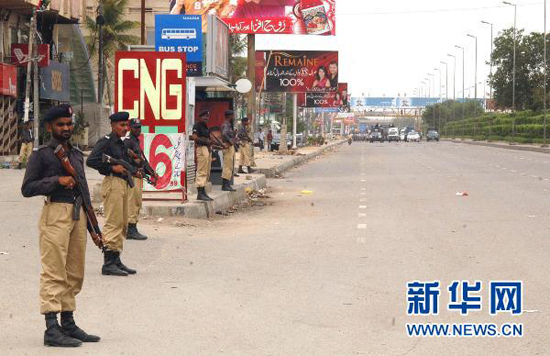Karachi remains tense after riots claim 63 lives
Life is yet to get back to normal on Wednesday after 63 people have died in the past 48 hours in continuing violence following Monday's assassination of a politician. Tension and arson still rule the southern port city of Karachi in Pakistan.
|
|
Streets in the city of over 15 million inhabitants remain deserted as the southern Sindh province is mourning the death of Raza Haider, a Muttahida Qaumi Movement (MQM) leader who was assassinated along with his bodyguard on Monday evening.
His death triggered violence across the major urban centers of province that left 63 people dead and 130 others wounded. Over 50 vehicles were torched, including 11 trucks on Wednesday morning. Firing still continue in different neighborhoods of Karachi as the day progressed in the troubled city.
Some of the gas stations that reopened after an impasse of day were crowded with long lines of vehicles waiting refueling whereas shops and all commercial centers remained closed on the second day of mourning announced by the aggrieved political party MQM. However, traffic remained extremely thin.
The two conflicting parties, ethnic Urdu language speaking MQM and ethnic Pashto speaker Awami National Party (ANP), are still engaged in their non-stop blame game holding each other responsible for murdering activists in target killings, the death toll has risen to over 700 this year. Over 60 deaths in July and 90 deaths in sniper firing in June, according to Karachi police sources.
Whereas Interior Minister Rehman Malik has passed the buck over the shoulders of disbanded extremist Sunni sectarian organizations Lashkar-e-Jhangvi and Sipah-e-Sahaba that had allegedly been on the forefront in assassinating Shia faith Muslim brethren during the past two decades.
An MQM local office was allegedly attacked by ANP activists a week ago leaving a few people dead, which had started a new string of rivalry between the two ethnic groups whereas the interior minister trying to frame up extremist militants into the pictures.
Local watchers believe that in order to keep its both coalition partners intact in the center as well in the Sindh and northwest Khyber Pakhtunkhwa province, the ruling Pakistan Peoples Party is shifting the onus of MQM leader Raza Haider and other target killings ad terror attacks on the sectarian disbanded outfits.
MQM is the second largest party in Sindh with 51 seats in the House of 166 after ruling PPP with 93 seats. ANP holds only two seats. MQM appeared on the mainstream national political scene after a landslide victory in 1988 general elections.
MQM is the fourth largest political party of Pakistan ranked after the ruling Pakistan Peoples Party (PPP), main opposition party the Pakistan Muslim League-Nawaz (PML-N) and PML-Quaid, has been keeping its vote bank as well as political maneuverability in the urban centers of Sindh province. ANP having a socialist bent of thought is ruling the troubled Khyber Pakhtunkhwa.
Despite ANP's insignificant size in the Sindh provincial assembly, PPP wants to keep it into the fold to look more cosmopolitan and democratic in its composition both in the center and in the south and northwest provinces. And, to keep the sentiments under control in the Khyber Pakhtunkhwa to keep its focus on war against terror in Pakistani tribal areas bordering Afghanistan, local analysts observed.
A number of significant arrests of most wanted extremist militants representing various disbanded firebrands during the past year had raised alarm regarding the presence of absconding militants fleeing the northwest tribal areas and taking refuge in Pashtun neighborhoods of Karachi, the fact MQM had been screaming for quite some time.
Analysts believe that the volcano of ethnic strife and terrorism that has been spewing hatred and death in the past two decades, has come to life once again and more violence and arson would be disturbing Karachi that effect the entire country.
 0
0 







